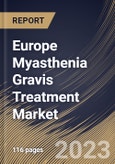Myasthenia gravis (MG) is a chronic autoimmune neuromuscular disorder characterized by muscle weakness and fatigue due to a breakdown in communication between nerves and muscles at the neuromuscular junction. This condition presents challenges in muscle movement, impacting various daily activities, and often requires long-term management to maintain a reasonable quality of life for patients. While MG is considered a rare disease, the number of diagnosed cases is increasing due to improved awareness, diagnostic techniques, and access to healthcare services. This rising prevalence is expanding the potential patient pool and driving the adoption of treatments.
Advances in diagnostic tools, including blood tests and neuroimaging, have led to more accurate and timely MG diagnosis. Earlier diagnosis encourages the prompt initiation of treatment, enhancing patient outcomes. Improved access to healthcare services, mainly specialized neuromuscular clinics and centres, facilitates the diagnosis and treatment of MG. Patients have greater access to expert care, including neurologists and immunologists experienced in managing MG. Advocacy groups and organizations for MG patients are critical in spreading awareness about the disease and the need for early treatment.
Europe has a growing aging population, leading to increased healthcare needs. Spending on healthcare increases because older people typically need more medical services, such as long-term care and treatments for chronic illnesses. European countries have been investing in innovative healthcare technologies and infrastructure. These investments aim to improve patient care, enhance diagnostics, and streamline administrative processes. Thus, growing healthcare expenditure in many countries of Europe is expected to boost the demand in the region.
The Germany market dominated the Europe Myasthenia Gravis Treatment Market by Country in 2022 and would continue to be a dominant market till 2030; thereby, achieving a market value of $240.1 Million by 2030. The UK market is exhibiting a CAGR of 8.1% during (2023 - 2030). Additionally, The France market would experience a CAGR of 9.8% during (2023 - 2030).
Based on End-use, the market is segmented into Hospitals, Clinics and Others. Based on Type, the market is segmented into Monoclonal Antibodies, Thymectomy, Cholinesterase Inhibitors, Chronic Immunomodulators, Rapid Immunotherapies and Others. Based on countries, the market is segmented into Germany, UK, France, Russia, Spain, Italy, and Rest of Europe.
The market research report covers the analysis of key stake holders of the market. Key companies profiled in the report include AstraZeneca PLC (Alexion Pharmaceuticals, Inc.), Octapharma AG, Novartis AG, Pfizer, Inc., Allergan PLC (AbbVie, Inc.), F. Hoffmann-La Roche Ltd., GlaxoSmithKline PLC (GSK), Bausch Health Companies Inc., Kedrion S.p.A, and Zydus Lifesciences Ltd.
Scope of the Study
Market Segments Covered in the Report:
By End-use- Hospitals
- Clinics
- Others
- Monoclonal Antibodies
- Thymectomy
- Cholinesterase Inhibitors
- Chronic Immunomodulators
- Rapid Immunotherapies
- Others
- Germany
- UK
- France
- Russia
- Spain
- Italy
- Rest of Europe
Key Market Players
List of Companies Profiled in the Report:
- AstraZeneca PLC (Alexion Pharmaceuticals, Inc.)
- Octapharma AG
- Novartis AG
- Pfizer, Inc.
- Allergan PLC (AbbVie, Inc.)
- F.Hoffmann-La Roche Ltd.
- GlaxoSmithKline PLC (GSK)
- Bausch Health Companies Inc.
- Kedrion S.p.A
- Zydus Lifesciences Ltd.
Unique Offerings
- Exhaustive coverage
- The highest number of Market tables and figures
- Subscription-based model available
- Guaranteed best price
- Assured post sales research support with 10% customization free
Table of Contents
Companies Mentioned
- AstraZeneca PLC (Alexion Pharmaceuticals, Inc.)
- Octapharma AG
- Novartis AG
- Pfizer, Inc.
- Allergan PLC (AbbVie, Inc.)
- F. Hoffmann-La Roche Ltd.
- GlaxoSmithKline PLC (GSK)
- Bausch Health Companies Inc.
- Kedrion S.p.A
- Zydus Lifesciences Ltd.








